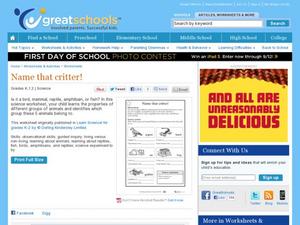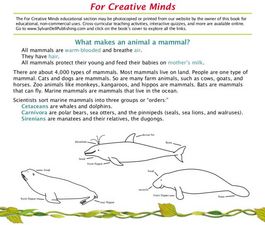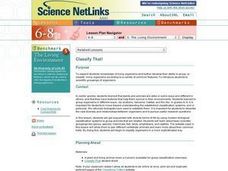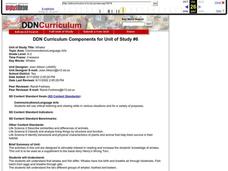Smarter Balanced
Classifying Vertebrates
What features do scientists use to classify animals into groups? Class groups examine a series of paired images of vertebrates (a bass and a trout, a toad and a newt, a crocodile and a tortoise, an owl and a robin, a tiger and a bear)...
Curated OER
What Class Are You In?
Classifying animals has never been this much fun! Pupils discuss the animal groups, fish, reptiles, amphibians, mammals, birds, and also identify their characteristics. Then, they take pictures of animals and classify them in a group...
Curated OER
The Five Classes of Vertebrates
What a terrific lesson! Learners discuss the animal kingdom, and classify them as vertebrates and invertebrates. They also identify them as fish, amphibians, reptiles, birds, and mammals. There is even a taxonomic breakdown of popular...
Curated OER
Name That Critter
Young learners classify five different animals into their proper category. The animals pictured are a pigeon, a lizard, a cat, a frog, and a goldfish. Pupils are also asked to tell why they know it's a certain kind of animal. An...
Curated OER
What's A Mammal?
Students examine mammals understanding what a mammal is and reviewing the eleven mammal groups. In this science lesson, students play a game known as Mystery Mammal Game. Yet, first students research about the mammal and then give...
Curated OER
Animal Classes-Mammal Birds Fish Reptiles Amphibian
Students learn about the characteristics of each animal classification. In this animal classification lesson students will first learn the characteristics of each classification. Then, they will find animals from given materials and...
Curated OER
For Creative Minds: What Makes an Animal a Mammal?
Students read about categories of mammals and their features. Students then construct a marine animal, using given print outs in the lesson. Students then create adaptations for their mammal, using a web site reference for guidance.
Larson Lab
Animal Classification
How are animals classified? Scholars explore animal classification by observing non-living and living specimens. They learn how to organize animals into vertebrates and invertebrates and identify the five vertebrate groups: mammals,...
Curated OER
Classify That!
Students explore diverse forms of life by using modern biological classification systems to group animals that are related. Students then study basic scientific groupings like genus, species, mammals, fish, birds, amphibians, and...
Curated OER
Creatures of the Grand Canyon
In this word search puzzle worksheet, students find and circle all of the wildlife hidden in a word search puzzle. Students also classify the animals into groups of mammals, birds, fish, reptiles, or amphibians.
Curated OER
Whales
Students compare the differences between whales and fish. They examine the differences of toothed and baleen whales. They identify behavioral and physical characteristics of animals that help them survive in their habitat.
Curated OER
Classifying Vertebrates
Second graders study animal characteristics and classification. In this animal characteristics and classifications lesson, 2nd graders determine how to classify vertebrates which include mammals, reptiles, amphibians, birds, and fish....
Curated OER
Classification of Animals
First graders investigate the characteristics of vertebrates. They classify each as mammal, fish, bird, and reptiles. Students explore the differences between various types of animals and classify each.
Curated OER
Classify That!
Students get acquainted with diverse forms of life by using modern biological classification systems to group animals that are related. They explore basic scientific groupings like genus, species, mammals, fish, birds, amphibians, and...
Curated OER
The Sights and Sounds of Orcas
Students investigate the orca whale. They participate in an online Webquest, listen to whale vocalizations online, answer discussion questions, and locate and read newspaper articles on marine mammals and orca whales.
Curated OER
The Animal Kingdom of Vertebrates
Seventh graders classify fish according to their characteristics. In this classification lesson students learn how to group animals including birds, reptiles and amphibians.
Curated OER
Classifying into Categories
In this classification instructional activity, students organize their thoughts by classifying the words from the box into the following categories: birds, mammals, reptiles, and fish.
Curated OER
Which Animals Are Vertebrates?
In this vertebrate animals worksheet, learners will classify 5 animals as belonging to the bird, mammal, reptile, amphibian, or fish group.
Curated OER
Classifying Life
In this classifying life worksheet, students review the 5 kingdoms of organisms by completing 10 matching and 7 fill in the blank questions.
Curated OER
Classifying Critters
In this classification worksheet, students describe the characteristics of the 5 groups of vertebrates and then complete 2 short answer questions.
South Gloucestershire Council
Animal Classification: A Collaborative Sorting Activity for Key Stages 2 & 3
Introduce the logic behind a dichotomous key or administer a group performance assessment with a fun and challenging classification lesson. With explicit instructions for the teacher and for collaborative groups, as well as engaging...
Curated OER
Classifying Commercial Marine Species
Learners investigate taxonomy. They explore some of the commercial marine species caught in Magdalena Bay and develop a classification system for presented animals.
Curated OER
A Planet Full of Animals
Students explore a variety of animals that live on our planet. The shapes, sizes, colors, movements, and coverings of the animals are observed. The similarities and differences in the animals are grouped according to common traits.
Curated OER
Identifying Vertebrates
In this biology worksheet, students look for the answers to how to classify animals. They specifically focus upon the vertebrates while differentiating the characteristics from other organisms.

























